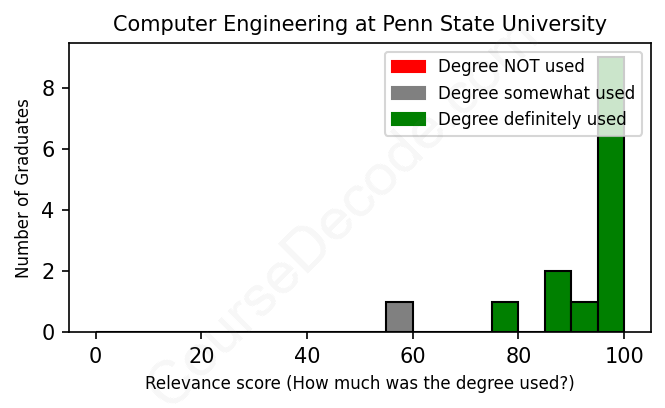
First, some facts. Of the Computer Engineering graduates from Penn State University we've analyzed , here's how many have used (or NOT used) their degree in their career:

These are estimates based on AI analysis of 14 LinkedIn profiles (see below).
The verdict? Great! Overall, with an average relevance score of 92%, Computer Engineering graduates from Penn State University have a substantially higher likelihood (+25%) of finding work in this field compared to the average graduate across all fields:
And for comparison, here's the chart for all profiles we've looked at across all degrees.
Also, after graduating, 35% of these graduates have pursued further education other than another Bachelor's degree (such as a Masters degree or other), which is right in line with the average across all fields.
See the details:
|
Relevance score: 100% We think this person has gone into a career highly relevant to their degree. We think this person has gone into a career highly relevant to their degree.
DEGREE INFOGraduated in 2020 from Penn State University with a Bachelor of Engineering - BE in Computer Engineering. No other secondary education since. JOB HISTORY SINCE GRADUATIONSoftware Engineer Roots Automation May 2021 - Present ABOUTNo information provided. |
The top 10 most common jobs done by the graduates we've analyzed (ranked most common to least) are:
When looking at the job paths of Penn State Computer Engineering graduates, it becomes pretty clear that a significant number of them end up in roles related to software development. Positions like Software Engineer, Associate Software Engineer, and Software Developer show up a lot, which makes sense given that software development is a key area of focus in computer engineering programs. These roles require strong technical skills, which are directly aligned with what students learn in their degrees, like programming, software design, and system architecture.
However, it's also notable that some graduates have ventured into positions that, while technically interesting, don’t leverage their computer engineering skills as much. Roles in consulting, project management, or specific positions like Project Leader at big firms tend to focus more on strategy and leadership rather than the nitty-gritty of engineering. Overall, while many graduates find jobs that directly relate to their studies, particularly in software engineering, there are also a fair number of roles that are not as relevant, suggesting that a Computer Engineering degree can be versatile but may not always lead to directly related positions.
Here is a visual representation of the most common words in job titles for Computer Engineering graduates (this is across all Computer Engineering graduates we've analyzed, not just those who went to Penn State University):

Graduates from Penn State University with a degree in Computer Engineering seem to generally have solid career trajectories. For many of them, the first job after graduation tends to be in software development or engineering roles, which is pretty much in line with what you'd expect. For instance, recent graduates quickly land positions at well-known companies like Amazon, Lockheed Martin, and even Microsoft. Over the first few years, these individuals often climb the ranks to more senior positions and can transition into specialized roles, like cybersecurity or AI engineering, which are really hot fields right now. For example, some have moved from being associate engineers to roles like Senior Cybersecurity Consultant or Lead AI Engineer within just a few years. It looks like they’re not only starting strong but also advancing quickly in their careers.
Fast forward about 5 to 10 years down the line, and many graduates hold impressive titles such as Project Leaders or Senior Engineers at leading companies. Some have also made the leap into consulting, taking roles at big consulting firms like McKinsey and Booz Allen Hamilton. The data shows a lot of them are well-established and clearly staying relevant in tech, with a good mix of entrepreneurial ventures and high-profile corporate roles. Overall, it seems like these Computer Engineering graduates are doing quite well for themselves, finding careers that are not only related to their field of study but are also growing and evolving as technology advances. So if you’re thinking about this major, it looks like a solid path to consider!
Honestly, a Bachelor’s degree in Computer Engineering can be pretty challenging, especially at a school like Penn State, which has a solid reputation for its engineering programs. You’re going to dive deep into a mix of electrical engineering and computer science, so expect a lot of math, programming, and hands-on projects. Some students find the workload to be rigorous, with tough exams and demanding lab work. But it’s not impossibly hard; if you stay organized, seek help when you need it, and keep a solid study routine, you can totally handle it. Just be ready to put in the time and effort, and you’ll come out on the other side with some solid skills.
Most commonly, in the LinkedIn profiles we've looked at, it takes people 4 years to finish a Bachelor degree in Computer Engineering.
It looks like a lot of these Penn State Computer Engineering grads are doing pretty well for themselves! The ones who graduated back in 2010 have climbed the ladder to roles like Principal at BCG, which usually means some solid pay, especially in consulting. Those who graduated more recently, like in 2020 and onwards, are also hitting the ground running with job placements at big companies like Amazon and Lockheed Martin, where salaries for software engineers can be quite lucrative. Even the folks in cybersecurity are landing good gigs, especially with companies like Booz Allen Hamilton. Overall, it seems like a lot of these grads are in positions that can promise decent salaries and job security.
Here is a visual representation of the most common words seen in the "about" section of LinkedIn profiles who have a Bachelor degree in Computer Engineering (this is across all Computer Engineering graduates we've analyzed, not just those who went to Penn State University). This may or may not be useful:

Here are all colleges offering a Bachelor degree in Computer Engineering (ordered by the average relevance score of their Computer Engineering graduates, best to worst) where we have analyzed at least 10 of their graduates:
| College | Score | Count |
|---|---|---|
 University of Florida University of Florida
|
95 | 18 |
 Michigan State University Michigan State University
|
94 | 10 |
 Brigham Young University Brigham Young University
|
94 | 10 |
 Penn State University Penn State University
|
92 | 14 |
 California Polytechnic State University-San Luis Obispo California Polytechnic State University-San Luis Obispo
|
91 | 14 |
 University of Central Florida University of Central Florida
|
90 | 14 |
 Georgia Institute of Technology Georgia Institute of Technology
|
90 | 14 |
 Purdue University Purdue University
|
86 | 34 |
 University of Illinois at Urbana-Champaign University of Illinois at Urbana-Champaign
|
86 | 30 |
 Iowa State University Iowa State University
|
86 | 25 |
 Texas A&M University Texas A&M University
|
85 | 17 |
 San Jose State University San Jose State University
|
85 | 16 |
 Clemson University Clemson University
|
85 | 14 |
 Dwarkadas J. Sanghvi College of Engineering Dwarkadas J. Sanghvi College of Engineering
|
85 | 10 |
 North Dakota State University North Dakota State University
|
84 | 12 |
 Savitribai Phule Pune University Savitribai Phule Pune University
|
83 | 25 |
 University of Mumbai University of Mumbai
|
82 | 43 |
 New Jersey Institute of Technology New Jersey Institute of Technology
|
81 | 11 |
 University of North Carolina at Charlotte University of North Carolina at Charlotte
|
79 | 11 |
 California State Polytechnic University-Pomona California State Polytechnic University-Pomona
|
76 | 11 |
 The University of Texas at Dallas The University of Texas at Dallas
|
76 | 18 |
 University of South Florida University of South Florida
|
69 | 10 |
 Gujarat Technological University, Ahmedbabd Gujarat Technological University, Ahmedbabd
|
55 | 13 |